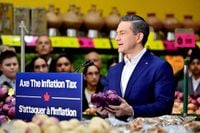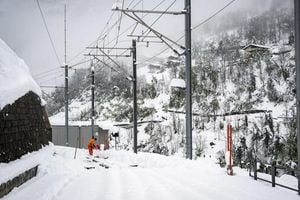The Conservatives and NDP spent the weekend of April 19-20, 2025, hunting votes in British Columbia, a key late-campaign battleground that one pollster says may offer Conservative Leader Pierre Poilievre his best shot at victory. Both Poilievre and NDP Leader Jagmeet Singh addressed Canadians’ cost-of-living concerns at campaign events in B.C. on Sunday, April 20, 2025.
Singh was asked if he was advocating strategic voting to shore up the party’s flagging support against possible Conservative inroads in the region. “I’m calling for people to vote according to what they care about most. And if they want to stop a Conservative here on Vancouver Island, the best way to do that is to vote for a New Democrat,” he said during a campaign stop in Victoria.
Singh also emphasized that Canadians concerned about cuts under a Liberal government should “send a New Democrat to Ottawa” to fight for them. The NDP won 13 of B.C.’s 43 seats in the 2021 federal election, but polls suggest those incumbent New Democrats may be vulnerable this time. Angus Reid polling released on April 14 projects a virtual two-way tie in B.C., with the Liberals and Conservatives at 42 percent each, the NDP at 11 percent, and the Greens at just three percent.
In Metro Vancouver, the Liberals under leader Mark Carney hold the lead with 49 percent of voter intention, though both the Conservatives and NDP have chipped away at that lead in the latest poll. The Angus Reid polling was conducted online between April 10-13, 2025, and cannot be assigned a margin of error. Angus Reid president Shachi Kurl noted that B.C. is one of the last federal “strongholds” for the NDP, partly due to the party's strong provincial performance.
Singh, who is running in the B.C. riding of Burnaby Central, reiterated his campaign promises to cap prices for food essentials and legislate protections against price gouging at grocery stores. Meanwhile, Poilievre kicked off Sunday at a grocery store in Surrey with another announcement on inflation. He argued that a reduction in government spending would ease pricing pressures, stating that a Conservative government would cut Ottawa’s annual budget for consultants by $10 billion.
“Inflation is what happens when governments spend money they don’t have, so they just print the cash. More money bidding on a fixed supply of goods equals higher prices for everything,” he explained. Statistics Canada reported on April 15 that the annual rate of inflation cooled slightly to 2.3 percent nationally in March, while food prices increased 3.2 percent year over year.
In addition to his spending cuts, Poilievre accused the Liberals of proposing $129 billion in new spending over the next four years on top of existing commitments. He criticized Carney, who led the Bank of England from 2013 to 2020, for his handling of inflation during his tenure, asserting that Carney’s policies contributed to rising prices.
Poilievre did not directly answer questions about whether he would maintain the national freeze on purchasing or transferring handguns, a policy introduced by the Liberal government in 2022. He argued that handguns on Canadian streets are largely brought in from the United States and pledged to crack down on firearm traffickers to address handgun violence.
At the Liberal rally in Nepean on Sunday, Carney was introduced by his wife, Diana Fox Carney, to a crowd of hundreds of supporters. In his speech, Carney highlighted his proposals to make Canada more resilient against threats from the United States. He drew comparisons between Poilievre and former U.S. President Donald Trump, briefly echoing a call from the crowd labeling Poilievre as “Timbit Trump.”
Among the participants in Nepean was Leigh Hall, who said she had never attended a political rally before but felt compelled to support Carney. “I’ve never felt the need to be beholden to one party, but this time around this is too important,” she stated.
Sunday was the second to last day of advance polls, which saw a record-setting turnout on Friday, April 18, when nearly two million people cast ballots, leading to long lineups at polling stations. Elections Canada reported that polls remained “very busy” on Saturday, April 19, and adjustments were being made to reduce wait times.
As the campaign heats up, the Conservatives and NDP are acutely aware of the stakes in British Columbia. Kurl remarked, “For the Conservatives, the path to victory has to be delivered through B.C., and for the NDP, it’s about holding on to dignity and/or party status.” She added that while the Liberals can win without taking B.C., the province would provide “extra insurance” for the incumbent government.
Poilievre's ongoing campaign in the Vancouver area has focused on his fiscal message and a promise to take a tougher approach to crime compared to the Liberal government. He has been vocal about the need for a change in leadership, asserting that “you will have out-of-control inflation if the Liberals get a fourth term.”
As the election date of April 28 approaches, the political landscape in British Columbia remains dynamic. The outcome in this province could prove pivotal for all three major parties, with voter sentiment shifting rapidly and the stakes higher than ever. The final days of the campaign will undoubtedly see intensified efforts from all sides to secure the crucial votes needed for victory.





